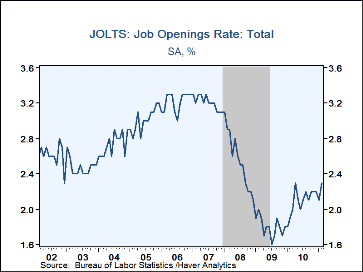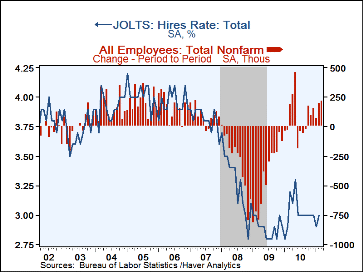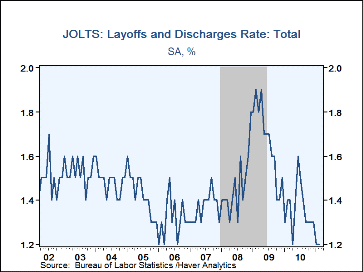 Global| Feb 28 2011
Global| Feb 28 2011U.S. Personal Income Improves but Spending Moderates
by:Tom Moeller
|in:Economy in Brief
Summary
Personal income rose an improved 1.0% last month, more-than-double expectations. However, the improvement was limited to a 2.1% spike in rental income, up 10.6% y/y. Elsewhere, income growth continued moderate. The December gain in [...]
 Personal income rose an improved 1.0% last month, more-than-double
expectations. However, the improvement was limited to a 2.1% spike in rental
income, up 10.6% y/y. Elsewhere, income growth continued moderate. The December
gain in income was unrevised at 0.4%. Disposable personal income increased 0.7%,
the fastest increase since April of last year.
Personal income rose an improved 1.0% last month, more-than-double
expectations. However, the improvement was limited to a 2.1% spike in rental
income, up 10.6% y/y. Elsewhere, income growth continued moderate. The December
gain in income was unrevised at 0.4%. Disposable personal income increased 0.7%,
the fastest increase since April of last year.
Growth in wages & salaries remained moderate at 0.3% (3.8% y/y) while proprietors' income grew 0.4% (6.4% y/y) following a 0.8% December spike. Economic improvement also raised dividend income by 1.1% (5.4% y/y) last month, the same as in December. A moderation of the rise in interest rates, which caused interest income to rise roughly 1.2% for three consecutive months, left the January gain at 0.2% and still down 0.9% y/y.
The rise in personal consumption expenditures was limited by severe winter weather to just 0.2% versus a 0.5% December gain, revised down from 0.7%. A 0.4% January increase had been expected. Spending on goods rose 0.7% (7.0% y/y) after an upwardly revised 1.0% December increase. A 1.3% jump (9.6% y/y) in gasoline expenditures was behind much of the overall gain. Constant dollar spending on gasoline fell 2.6% (-1.9% y/y). Spending on apparel was unchanged (+5.6% y/y) following a 0.4% December decline. Spending on furniture fell 0.2% (+4.5% y/y) but spending on motor vehicles rose 0.6% (21.3% y/y), up 19.5% y/y in real terms. Spending on services slipped modestly (+2.6% y/y).
The personal savings rate improved to 5.8% from an upwardly revised 5.4% in December. The latest equaled the 5.8% for all of last year which was roughly constant with 2009. However, these rates remained up from the monthly low of 1.8% late in 2007.
Price inflation increased with higher energy prices. The PCE chain price index rose 0.3% last month after a 0.3% December rise. Higher energy costs accounted for the increase with a 2.3% (6.7% y/y) jump. Food prices also gained an accelerated 0.7% (1.7% y/y). The core PCE price deflator ticked up just 0.1% and 0.8% y/y), still a record low.
The personal income & consumption figures are available in Haver's USECON and USNA databases.
| Personal Income & Outlays (%) | Jan | Dec | Nov | Y/Y | 2010 | 2009 | 2008 |
|---|---|---|---|---|---|---|---|
| Personal Income | 1.0 | 0.4 | 0.3 | 4.6 | 3.0 | -1.7 | 4.0 |
| Wages & Salaries | 0.3 | 0.3 | -0.0 | 3.8 | 2.1 | -4.3 | 2.1 |
| Disposable Personal Income | 0.7 | 0.4 | 0.3 | 3.9 | 3.1 | 0.7 | 5.1 |
| Personal Consumption Expenditures | 0.2 | 0.5 | 0.3 | 4.0 | 3.5 | -1.0 | 3.0 |
| Saving Rate | 5.8 | 5.4 | 5.4 | 5.7 (Jan.'10) |
5.8 | 5.9 | 4.1 |
| PCE Chain Price Index | 0.3 | 0.3 | 0.1 | 1.2 | 1.7 | 0.2 | 3.3 |
| Less Food & Energy | 0.1 | 0.0 | 0.1 | 0.8 | 1.3 | 1.5 | 2.3 |
Tom Moeller
AuthorMore in Author Profile »Prior to joining Haver Analytics in 2000, Mr. Moeller worked as the Economist at Chancellor Capital Management from 1985 to 1999. There, he developed comprehensive economic forecasts and interpreted economic data for equity and fixed income portfolio managers. Also at Chancellor, Mr. Moeller worked as an equity analyst and was responsible for researching and rating companies in the economically sensitive automobile and housing industries for investment in Chancellor’s equity portfolio. Prior to joining Chancellor, Mr. Moeller was an Economist at Citibank from 1979 to 1984. He also analyzed pricing behavior in the metals industry for the Council on Wage and Price Stability in Washington, D.C. In 1999, Mr. Moeller received the award for most accurate forecast from the Forecasters' Club of New York. From 1990 to 1992 he was President of the New York Association for Business Economists. Mr. Moeller earned an M.B.A. in Finance from Fordham University, where he graduated in 1987. He holds a Bachelor of Arts in Economics from George Washington University.
More Economy in Brief
 Global| Feb 05 2026
Global| Feb 05 2026Charts of the Week: Balanced Policy, Resilient Data and AI Narratives
by:Andrew Cates








